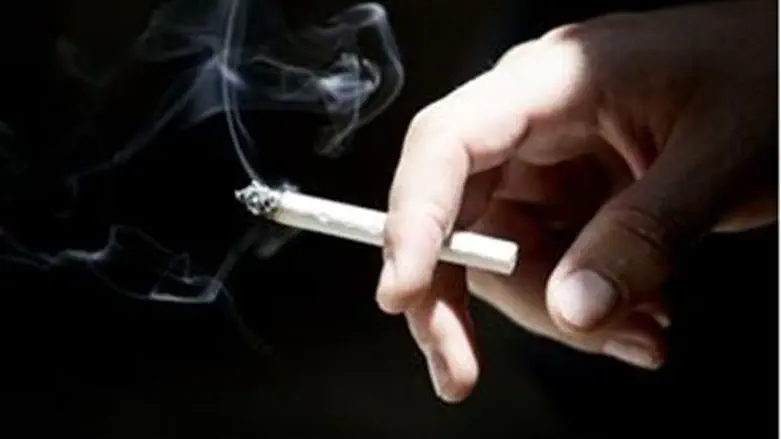
Israel's Health Ministry published an alarming report on Sunday May 31, on the occasion of World 'No Tobacco Day.'
According to the report, the smoking rate of Israelis aged 21 and over, as of 2014, is approximately 19.8% - nearly a fifth of the country.
Compared to two different reports from 2013, this figure could represent a drop or a rise. The Central Bureau of Statistics "Social Survey 2013" placed the smoking rate at 23.1% while the survey "Knowledge, Attitudes, and Health Behavior in Israel 2013" placed it at 18.7%.
Broken down by gender, 27.3% of Israeli men smoke compared to 12.6% of Israeli women. In terms of nationality, the smoking rate is 26.3% among the Arab population and slightly lower at 18.4% among the Jewish.
More than half of men who smoke reported consuming 10-20 cigarettes a day, while around 40% of women who smoke consume less than 10 cigarettes per day.
The rate of smoking among men in Israel (27.3%) is slightly lower than the average (28.5%) of European Union countries. Similarly, the rate of smoking among women in Israel (12.6%) is quite low relative to EU countries, which stands at 17.7%.
About 35% of the survey's respondents, who are non-smokers, reported they are exposed to secondhand smoke. The figure drops slightly among Jews with 30%, while more than 50% of Arab respondents confirmed exposure.
Men are prone to secondhand smoke exposure in the workplace, while women are more exposed at home.
According to expert estimates, smoking is responsible for approximately 8,000 deaths in Israel per year - 700 of them among nonsmokers exposed to secondhand smoke.
Estimates put the direct and indirect cost of smoking's damage to the health care system at around 1.7 billion shekels per year. Additional indirect costs caused by loss work productivity and illness are estimated at 1.9 billion, and the value of human loss amounts to 8 billion.
In total, the direct and indirect cost of smoking to the Israeli economy is estimated at 12.8 billion shekels a year.
Parallel to this amount is the 8.2 billion shekels Israeli households in 2014 spent on the purchase of tobacco products for the purpose of smoking. This figure is even higher than what Israeli consumers spent on dairy in 2014 - 7.5 billion shekels.
In households of lower socioeconomic status, these costs often reach 25% of the monthly income of the household, causing, among other things, damage to nutrition and increased gaps in health and society.
The number of applicants to Israeli health care providers for quitting smoking in 2014 totaled 26,818. Only about 40% of them remained smoke-free a year after the workshop.